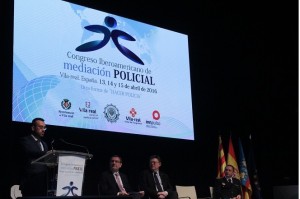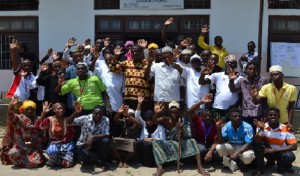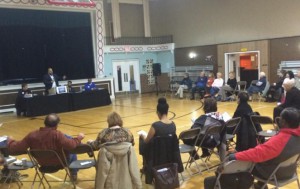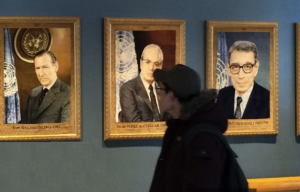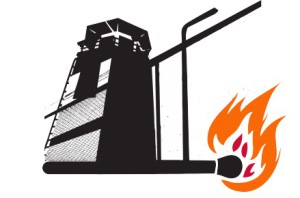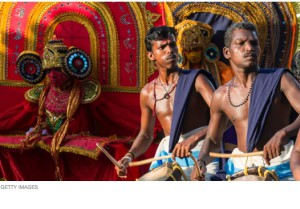. . SUSTAINABLE DEVELOPMENT . .
An article by Reno Berkeley in Inquisitr
On September 17, 2011, the Occupy Wall Street movement exploded onto the scene. Peaceful protestors set up tents and sleeping bags in New York City’s Zuccotti Park. The movement’s slogan was “We are the 99 percent.” Protestors railed against big banks, the growing foreclosure scandal, and political corruption. Five years later, the Occupy movement finally has the leader it never really had: Bernie Sanders.
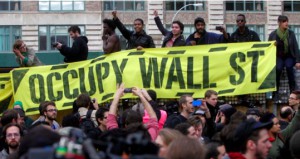
In the years since the movement was squelched by a chillingly multi-pronged alliance between various U.S. government agencies and private enterprise, resentment toward those who retain a chokehold on power and money has simmered just below the surface, ready to boil over.
Enter Bernie Sanders, who has been widely embraced by those hungry for substantial change, unsatiated by simple platitudes. Did Occupy really fuel the fire of Sanders’ popularity? I asked asked members of various Bernie Sanders Facebook groups for their opinions. Approximately 20 people answered the question of whether Occupy Wall Street helped influence the election by making voters more ready to hear Bernie Sanders’ message.
Most of those who answered believed that the Occupy Movement had at least some impact in helping propel Bernie into the spotlight. Only three people did not believe the movement influenced his popularity at all. While some folks believed that Occupy didn’t change anything substantially in terms of government and policy, they did believe that it made the public more amenable to his message.
One Sanders supporter believed that Occupy is the only reason Bernie is running for president. Without Occupy to stir the pot and force a national conversation about income inequality, would the public be ready to listen to his message? Another user gave a little more detail as to why she believes it has influenced the primary race: “Occupy accomplished one thing, and that was making public dialogue out of part of the message Senator Sanders had been saying his whole career. I don’t think that the issues Occupy brought up (regarding Wall Street) would have been discussed without Bernie’s candidacy.”
When the Inquisitr interviewed Jordan Martin, the young woman behind Bernie Journey, we asked her about the Occupy Movement. She also believed that it helped raise awareness to the issues Sanders has advocated for his entire career: “Yes I do believe that the Occupy Movement has helped Bernie’s campaign. He’s the only candidate that stands against Wall Street and is not afraid to speak out against the corruption.”
(Article continued in right column)
Questions for this article
The peace movement in the United States, What are its strengths and weaknesses?
(Article continued from left column)
A December 2012, investigative story in The Guardian provided an Orwellian view of what happened with Occupy. In the first paragraph of Naomi Wolf’s piece, she reveals that the FBI, Department of Homeland Security, and local police coordinated together to crush the movement. What’s worse, the very banks the movement was protesting against were also behind it.
A document procured through the Freedom of Information Act by the Partnership for Civil Justice Fund shows just how wide the web of oppression spreads: “The document…shows a terrifying network of coordinated DHS, FBI, police, regional fusion center, and private-sector activity so completely merged into one another that the monstrous whole is, in fact, one entity: in some cases, bearing a single name, the Domestic Security Alliance Council.”
The well-oiled coordination between multiple agencies and businesses are exactly the kind of corruption Sanders has rallied against since he protested against racial segregation in the 1960s. And he continues to battle the machine, only this time, it’s corporate media outlets, chiefly, CNN, whose parent company, Time Warner, is one of Hillary Clinton’s top donors. Sanders has also had to battle the Democratic National Committee and Debbie Wasserman-Schultz, who not long ago told a news outlet the purpose for superdelegates was to prevent grassroots candidates from winning elections.
Bernie Sanders, is a grassroots candidate, but he’s become a powerhouse the likes of which the DNC can’t ignore. His most recent rallies in Utah and Arizona attracted tens of thousands of supporters waiting to hear his speeches. And Bernie might not have gotten very far if not for the attention Occupy brought to the very issues Sanders has held close to his heart since he chained himself to a young Black woman back in 1962.
Whereas the Occupy Movement lacked real leadership and cohesion, Bernie Sanders has essentially stepped forward to become the defunct movement’s de facto leader through his presidential campaign. Part of his appeal is that he hasn’t usurped the public sentiment against corruption in government and big business. Rather, his appeal stems from the fact that he has worked toward the very things the Occupy Movement symbolized: economic equality, racial equality, equality in educational access, immigration reform. The list goes on.
For five years, the movement’s fire was dimmed, never quite flickering out. Last year, Bernie Sanders stepped up to the glowing embers, added kindling to the fire, and began speaking to the proverbial empty room. Slowly, one by one, voters heard his message. Eleven months later, neither the government, the big banks, nor billionaires can can stop the fire that Bernie Sanders stoked. Indeed, Bernie’s political revolution has his supporters feeling the Bern.

